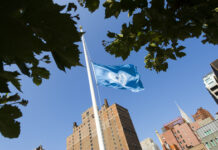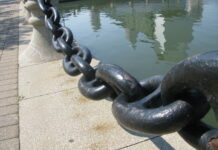Photo credit: DiasporaEngager (www.DiasporaEngager.com).
In the wake of the horrific September 11 attacks in 2001, Queen Elizabeth II sent a condolence message to the families of the 250 British victims, telling them that “grief is the price we pay for love.”
I arrived in Israel earlier this week, and as I stepped into the warm, balmy air outside Ben Gurion Airport, the late Queen’s words really resonated. This is my fifth visit to Israel since October 7th, and the grief here is palpable.
Each visit reveals a country in collective mourning for innocent lives lost and brutal violence endured. But last weekend, this grief took on a sharper edge, embodied by a name that has come to symbolize both hope and despair: Hersh Goldberg-Polin.
Hersh’s story is one of unyielding love that has now turned to unbearable grief. A 24-year-old American Israeli, born in Berkeley, California, and raised in Jerusalem, Hersh’s life was filled with promise. But on October 7th, while attending the Nova music festival near the Gaza border, he became a victim of Hamas’s savage attack.
The terrorists killed hundreds of revelers and took dozens hostage, including Hersh. While hiding in a shelter, a grenade thrown by the terrorists severed Hersh’s arm. Although he survived, Hersh was taken captive, the stump of his arm crudely bandaged as he was thrown onto a pickup truck — a moment captured and broadcast around the world.
Over the past 11 months, Hersh’s parents, Rachel and Jon, became tireless advocates for their son’s release. American-born Jews who moved to Israel 16 years ago, they traveled the globe, knocking on every door, speaking to anyone who would listen.
They met with US President Joe Biden, Pope Francis, and other world leaders. Just weeks ago, they highlighted Hersh’s plight at the Democratic Party Convention — not as another statistic, but as a vibrant young man with wonderful dreams, a loving family, and a bright future.
Rachel and Jon’s fight was not just for Hersh, but for every hostage held by Hamas. But last weekend, their relentless efforts ended with tragedy. As Shabbat began, they turned off their phones, holding onto the hope that their son might soon be released.
But when they turned their phones back on after Shabbat, they were confronted with devastating news: Hersh’s body had been found in a tunnel under Gaza, alongside five other hostages, all of them executed at close range just before IDF rescue teams could reach them.
The grief of Hersh’s loss is immense. His story is not just his own; it is the story of every hostage, every family clinging to hope, and every Israeli living amidst fear and uncertainty. It is the story of Jews worldwide facing a resurgence of virulent antisemitism, and of those who see Israel’s struggle against Hamas as a frontline battle between good and evil.
Hersh’s parents’ relentless fight to secure his release — their heartbreak and despair — mirrors the struggle of every person in the free world committed to defeating evil and restoring justice.
Hersh’s death is not just a singular tragedy; it starkly illustrates the stakes in the ongoing conflict with Hamas, against those who favor violence as the only means to advance their agenda. The murder of Hersh Goldberg-Polin and five other hostages, moments before they could have been rescued, accentuates the cruelty that Israel and the civilized world are up against.
But beyond that, Hersh’s story reveals a broader failure: the failure of leadership — both in Israel and globally — to protect the innocent and stand firmly against terror.
Parshat Shoftim speaks directly to the themes of justice and leadership. Moses commands the Israelites to appoint judges and officers to uphold justice, declaring (Deut. 16:20): צֶדֶק צֶדֶק תִּרְדֹּף — “Justice, justice shall you pursue.”
According to the commentaries, the repetition of the word “justice” underscores the significance of justice, not just as an ideal in itself, but as a principle that requires utter integrity in its pursuit.
In the context of Hersh’s murder, these words resonate deeply. We have seen failures of leadership on multiple fronts. While everyone claims to want justice, frustration with the international community’s willingness to engage with Qatar and Hamas, and the Israeli government’s clumsy handling of hostage negotiations has grown. Reports of missed opportunities for deals that might have freed Hersh and others have only added to this outrage.
It was in this context that Israeli President Isaac Herzog delivered a heartfelt apology at Hersh’s burial. Speaking with a broken heart, Herzog apologized “on behalf of the State of Israel” for failing to protect Hersh and the other hostages and for not doing more to bring them home.
His words struck a deep chord with a nation coming to terms with its leaders’ failures. “We failed you,” Herzog admitted, echoing the regret felt by many.
In stark contrast to these failures, Rachel and Jon’s advocacy embodies the pursuit of justice that Shoftim demands. They showed that their son’s life and the lives of the other hostages are not bargaining chips or political pawns; all the young men and women in Hamas hands are precious souls worth every effort to save. Crucially, Rachel and Jon’s dignity in the face of unimaginable grief is a powerful reminder of the kind of righteousness that goes well beyond platitudes.
The tragic loss of Hersh and the other hostages forces us to reflect on our own responsibilities. The call to “pursue justice” is clearly not passive; it demands courage, clarity, and moral conviction.
Virtue signaling and hollow gestures — like the Histadrut’s ill-conceived call for a labor strike — accomplish nothing beyond momentary headlines. And Prime Minister Netanyahu’s platitudinous apologetics and blame-shifting are particularly difficult to take. His approach, which has sadly been marked by evasion rather than accountability, is not leadership.
True leadership is not about projecting toughness or finding scapegoats; it is about having the courage to show vulnerability, admit mistakes, and take responsibility.
Rachel and Jon have demonstrated what real leadership looks like: a combination of relentlessness — knocking on every door, speaking into every ear, and never giving up hope, even when the path is dark — and, most importantly, doing so with integrity and dignity.
Without allowing themselves to get drawn into the fray, Rachel and Jon demanded justice not just for their son, but for every hostage and every innocent life ensnared in terror.
Ultimately, justice for Hersh Goldberg-Polin and all the hostages will not come from ill-conceived labor strikes or cleverly-worded speeches, nor will it come from carefully curated words aimed at gaining electoral votes, or a proliferation of likes on social media. It will only come when we, as a community and as a nation, recognize our duty to demand more from ourselves and from our leaders.
The author is a rabbi in Beverly Hills, California.
Source of original article: Pini Dunner / Opinion – Algemeiner.com (www.algemeiner.com).
The content of this article does not necessarily reflect the views or opinion of Global Diaspora News (www.GlobalDiasporaNews.com).
To submit your press release: (https://www.GlobalDiasporaNews.com/pr).
To advertise on Global Diaspora News: (www.GlobalDiasporaNews.com/ads).
Sign up to Global Diaspora News newsletter (https://www.GlobalDiasporaNews.com/newsletter/) to start receiving updates and opportunities directly in your email inbox for free.





























